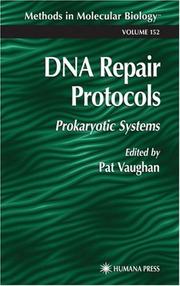| Listing 1 - 3 of 3 |
Sort by
|

ISBN: 089603643X 0585354332 9786610820597 1280820594 1592590683 Year: 2000 Publisher: Totowa, NJ : Humana Press : Imprint: Humana,
Abstract | Keywords | Export | Availability | Bookmark
 Loading...
Loading...Choose an application
- Reference Manager
- EndNote
- RefWorks (Direct export to RefWorks)
DNA repair has assumed a new importance with the discovery that malfunctioning of the DNA repair pathways in humans can lead to many disease states. In DNA Repair Protocols: Prokaryotic Systems, well-versed investigators describe in step-by-step detail a wide range of DNA repair activities, from single act-alone repair proteins to complex repair systems. These practical protocols not only detail the various repair activities found in cells, but also demonstrate the use of DNA repair proteins and systems as reagents in molecular biology and biotechnology. The techniques described here include mutation and polymorphism detection, which are useful in the search for disease genes and drug response genes, as well as for breeding and trait selection in animals and plants. Each readily reproducible protocol is presented by a hands-on expert in sufficient detail to ensure robust experimental results and is supplemented by chapter introductions, as well as notes offering a wealth of interesting and useful information. Compact and highly practical, DNA Repair Protocols: Prokaryotic Systems provides expert guidance to both the DNA repair researcher studying the fundamental aspects of DNA repair and the applied researcher in human genetics and biotechnology.
DNA repair --- Life sciences. --- Cell biology. --- Life Sciences. --- Cell Biology. --- Cell biology --- Cellular biology --- Biology --- Cells --- Cytologists --- Biosciences --- Sciences, Life --- Science --- Biochemical genetics. --- Chemical genetics --- Biochemistry --- Molecular genetics --- Deoxyribonucleic acid repair --- Repair, DNA --- Repair mechanisms in DNA --- Biochemical genetics --- Antimutagens --- Cytology.
Book
Year: 1976 Publisher: Don Mills (Ontario) : New Press,
Abstract | Keywords | Export | Availability | Bookmark
 Loading...
Loading...Choose an application
- Reference Manager
- EndNote
- RefWorks (Direct export to RefWorks)
Book
ISBN: 088770221X 9780887702211 Year: 1976 Publisher: Don Mills, Ont. : New Press,
Abstract | Keywords | Export | Availability | Bookmark
 Loading...
Loading...Choose an application
- Reference Manager
- EndNote
- RefWorks (Direct export to RefWorks)
Deaf children --- Hearing impaired children --- Hearing impaired children. --- Education.
| Listing 1 - 3 of 3 |
Sort by
|

 Search
Search Feedback
Feedback About UniCat
About UniCat  Help
Help News
News